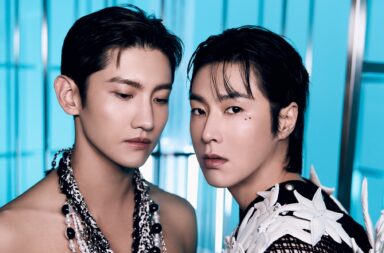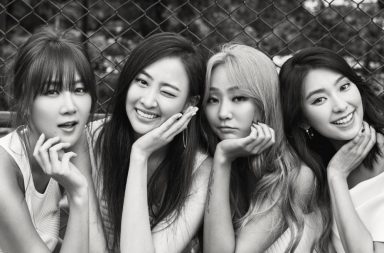 Welcome to this week’s Roundtable!
Welcome to this week’s Roundtable!
Given that Korea is a country that heavily delineates between different gender roles in society, it comes as no surprise that there are also heavy differences in how girl groups and guy groups are perceived, managed, and received within the K-pop sphere.
Keeping in mind elements such as a group’s concept, music, talent, fanbase, influence, income and longevity, who do you think ultimately has it better in K-pop, girl groups or guy groups?
Maddie: I think that really depends on the overall level of talent and audience appeal. I don’t think boy groups are any better or more successful than girl groups because of gender. 2NE1 may be linked to Big Bang, but it’s not because they are a girl group; it’s because of how they debuted. KARA is pretty big in Japan but it’s not because they are a girl group; it’s because they appeal more to their Japanese audience, which is their main market at the moment.
Before I go on, my point is that gender may not really decide which is better overall. I believe groups are managed, perceived and received according to what each member and the group as a whole has to offer. Sexy is sexy, whether it be in the form of slender legs or chocolate abs. A great voice is a great voice, and a bad one is a bad one. Whether a boy or girl group, they still need to perform well, sing in key, look attractive and be on point with their choreography. Both girl groups and boy groups have to work hard so I can’t say either of them have it better.
 Nabeela: In my opinion, I think boys have it a lot easier than girls do. For instance, boys have a broader range of musical styles to experiment with that will still largely be received in a positive light, whereas girls often times seem boxed into cute or sexy concepts, or some combination of both. Also, I have often felt that it is a little easier for guys to get away with stupid remarks on air, live, or in real time simply because they can more easily assume some jocular pretext or precedence than girls can about the same situations, but I guess that also has to do with the ways in which girls have (or even have been allowed) to experiment with their personalities outside the cookie-cutter idol exterior. I think both boys and girls fight their struggles for appearances, and I will concede the easier side to the girls when it comes to the looks department because it seems more realistic to make a girl prettier (as she has availability to plastic surgery, make up, revealing clothing, and of course, the all-kill aegyo stunts). I also think it is easier for girls to get by simply on looks — we all know K-pop is no sanctuary of harmonious angels. Plenty — and I mean plenty — of female artists cannot sing a formidable note, but somehow stay afloat on the mainstream because of their visual appeal, from musical concept or other contracted jobs like CF’s and ads.
Nabeela: In my opinion, I think boys have it a lot easier than girls do. For instance, boys have a broader range of musical styles to experiment with that will still largely be received in a positive light, whereas girls often times seem boxed into cute or sexy concepts, or some combination of both. Also, I have often felt that it is a little easier for guys to get away with stupid remarks on air, live, or in real time simply because they can more easily assume some jocular pretext or precedence than girls can about the same situations, but I guess that also has to do with the ways in which girls have (or even have been allowed) to experiment with their personalities outside the cookie-cutter idol exterior. I think both boys and girls fight their struggles for appearances, and I will concede the easier side to the girls when it comes to the looks department because it seems more realistic to make a girl prettier (as she has availability to plastic surgery, make up, revealing clothing, and of course, the all-kill aegyo stunts). I also think it is easier for girls to get by simply on looks — we all know K-pop is no sanctuary of harmonious angels. Plenty — and I mean plenty — of female artists cannot sing a formidable note, but somehow stay afloat on the mainstream because of their visual appeal, from musical concept or other contracted jobs like CF’s and ads.
Still, I don’t think this is an argument that can be cut right down the middle. Both boys and girls seems to have it harder and easier where their roles see fit, so in truth, it is a little hard to definitely say one side has it more difficult than the other.
Fannie: In terms of longevity, boy groups have a major drawback: mandatory military enlistment. This policy creates an automatic expiration date on the group from the get-go. Although this expiration date may be staggered and it is possible in rare instances to return to a group (for example, since Kangin enlisted early, he still has a group to return to) there is still a net disadvantage from being away from the scene, especially since K-pop has a short attention span and high turnover rate. Only groups with an incredibly strong determination to stay together, as well as an incredibly loyal fanbase, are going to be able to surmount this obstacle (Shinhwa).
Girl groups also face an expiration date, although from a different source: their own bodies. At some point, they are going to have to get married and bear children, and that is (at least temporarily) something of a full-time commitment. Not only that, but the importance of looks within a girl group is a double-edged sword, since K-pop is ever in search for eternal youth.
Overall, both girl and guy groups face obstacles in different ways; it is hard to say who has it better, although personally if I had to choose (regardless of my own gender), I would want to be in a guy group because conceptually, they seem to be less boxed in.
 Bethany: I think both boy and girl groups face different sets of issues in the world of K-pop, so it’s incredibly hard to say who has it easier. Girls are definitely confined to certain concepts (sexy or cute, take your pick!) while it seems that guys are allowed to be a little more versatile with their concepts. But guys do face the 2-year long military service thing, which usually puts an awkward pause in the middle of their career…and we all know that fandom is pretty fickle. Both boy and girl groups face haters, grueling hours of dance practice, countless episodes of variety shows, and weeks of promoting albums on end. Ultimately, success depends on how much talent the group possesses, how much stamina the group has overall, and how well their entertainment company manages them, not on who “has it better” because, well, being in a K-pop group is hard and I don’t think gender plays a role in making the process any easier for boy or girl groups.
Bethany: I think both boy and girl groups face different sets of issues in the world of K-pop, so it’s incredibly hard to say who has it easier. Girls are definitely confined to certain concepts (sexy or cute, take your pick!) while it seems that guys are allowed to be a little more versatile with their concepts. But guys do face the 2-year long military service thing, which usually puts an awkward pause in the middle of their career…and we all know that fandom is pretty fickle. Both boy and girl groups face haters, grueling hours of dance practice, countless episodes of variety shows, and weeks of promoting albums on end. Ultimately, success depends on how much talent the group possesses, how much stamina the group has overall, and how well their entertainment company manages them, not on who “has it better” because, well, being in a K-pop group is hard and I don’t think gender plays a role in making the process any easier for boy or girl groups.
Salima: When it comes to double standards, boys have it easier. I’d like to give two examples of this.
Remember when there was the big hoopla over SNSD‘s Jessica getting plastic surgery? Before and after photos were placed side by side, showing how her jaw may or may not have been shaved down. Everyone was kicking up a fuss, as if her getting plastic surgery was a reflection of her talent. There’s always prodding speculation about whether or not girls have gotten plastic surgery, but when it comes to boys, that speculation is almost non-existent. Or rather, the backlash for having gotten surgery is minuscule compared to the flak girls get.
The second double standard that makes it difficult for girls are sexy performances. I don’t know how many times I’ve seen 2PM (bless their hearts and bless their bodies) gyrating on stage and ripping their shirts off to “Back to You.” Believe me, I have zero problems with that. However, when a girl group like Sistar delivers the same kind of performance, slinking on stage sexually, they’re considered “cheap.” I don’t care how sexy girls and guys are on stage. As long as everyone gets the same backlash for it, or the same applause, it’s fine with me.
Dana: Ultimately, I would say that the ladies have the upper hand simply because they have a much broader appeal — not to mention uncle fans that lavish them with luxury goods. But it is undoubtedly a double-edged sword. As has been pointed out, the things that girl groups have to do in order to maintain their fan base are subject to much greater scrutiny. The success of girl groups, I think, carries a greater price tag.
 Gil: The life of an idol is not easy. Constant schedules that keep you working for most of the day makes any idol’s life difficult, but for me, it’s harder to be in a girl group. Like Salima said, girl groups are the object of harsher criticism. When Rania was gyrating on stage with a sexy concept netizens were quick to throw insults at them, but when someone like 2PM or Beast rip their shirts off? I feel like the females are subjugated to more double standards.
Gil: The life of an idol is not easy. Constant schedules that keep you working for most of the day makes any idol’s life difficult, but for me, it’s harder to be in a girl group. Like Salima said, girl groups are the object of harsher criticism. When Rania was gyrating on stage with a sexy concept netizens were quick to throw insults at them, but when someone like 2PM or Beast rip their shirts off? I feel like the females are subjugated to more double standards.
As my colleagues have stated previously, female groups also generally stick to certain concepts: sexy, cute, or some variation thereof, whereas with male groups it’s a bit more varied. Also, if female groups are caught in a scandal it’s pretty much the end of their career.
Patricia: Stepping away from the gender debate for a bit, I’d like to make the argument that girl groups tend to be more accepted by the general public. For one, girl groups boast fanbases filled with both male and female fans, whereas fans of boy groups are pretty much all female. That in itself makes the appeal of a girl group more universal. Even outside of Korea, the whole concept of boy groups holds such a rigid set of negative connotations (the members are all gay, effeminate, untalented, naive, cater only to the whims of fangirls, et cetera) that it’s difficult for a boy group to be widely accepted simply because they are a boy group. SNSD is oftentimes regarded as Korea’s national girl group, but quite honestly, I think you could drop the “girl” part of that title and it’d still hold true. Personally, I find it very difficult imagining Korea ever having a national boy group, even with the ample supply of boy groups at its disposal.
The disadvantages or prejudices held against girl groups can pretty much be said for the entire female population in Korea; it’s just that the prejudices and double standards female K-pop celebs are more highlighted because these celebs are constantly in the spotlight. That’s just how celebrity culture works. But at the same time, I hope that the emphasis placed on gender inequality in the K-pop industry would eventually shed light on the gender inequality that runs parallel throughout the rest of Korean society.


